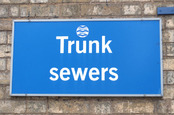This article is more than 1 year old
Oh crap: UK's digital overlords moot new rules to help telcos lay fibre in sewer pipes
That's the Department of Fun to you
In order to meet its full-fibre pledges, the UK government is examining the possibility of giving broadband firms access to more than a million kilometres of underground infrastructure owned by other utility firms: including electricity, gas, water, and sewerage networks.
The Department for Digital, Culture, Media & Sport (DCMS, aka the Department of Fun) has opened a call for evidence — closing on September 4, 2020 — that could inform a change in legislation allowing broadband networks to share infrastructure with other utility providers.
Dept of Fun minister Matt Warman said he is also open to changes in legislation that would improve the access of network providers to run cables along existing road and rail networks.
"It makes both economic and common sense for firms rolling out gigabit broadband to make use of the infrastructure that already exists across the country. This will help them avoid the high costs and disruption of having to dig or build their own and ultimately benefit consumers," said Warman.
"We've seen progress with improved access to Openreach's ducts and poles, but other telecoms companies have large networks that are not easily accessible. We want them, and utility companies, to do more to open these up and help speed up getting next-generation broadband to people across the UK," he added.
One avenue of pursuit would see the Access to Infrastructure (ATI) Regulations 2016 reformed to facilitate better information-sharing between utility providers. It would not, however, mandate any commercial decisions on the behalf of the likes of OpenReach.
Openreach has set a target to deactivate the legacy copper network by the end of this decade, and has already started retiring copper sales in some areas. This effort — which has the support of Ofcom and central government — will inevitably cost billions.
Estimates from the National Infrastructure Commission (NIC) reckon that infrastructure re-use could make this vastly cheaper, producing an £8bn in cost savings for providers like OpenReach and Virgin Media. And that's significant, considering civil works (namely deploying cables and poles) can account for 80 per cent of the overall cost.
Already, this effort to replace copper has caught pace, with Openreach yesterday announcing it had already wired up its first full-fibre metropolis: quaint cathedral city and noted Russian tourism fave, Salisbury. So far, over 20,000 premises in Salisbury have gigabit broadband, and Openreach intends to discontinue copper sales this year.
It is, however, not the first full-fibre city in the UK. Thanks to KCOM, that honour goes to one-time European Capital of Culture, Hull. ®

